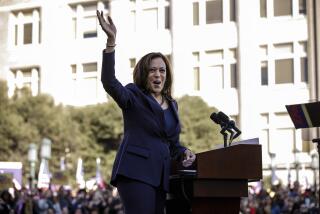Inauguration is a ‘woo-hoo’ moment for black Occidental student
- Share via
The presidential inauguration in her below-freezing hometown of Washington, D.C., was up on the big screen in an Occidental College auditorium, but Lindsay Washington was in flip-flops, a T-shirt and blue jeans, which tells you the kid can never go home again.
“I’m definitely going to live here after college,” the 22-year-old confessed.
She’d flown in from D.C. on Monday night, trading 20 degrees for 80, ready to start her final semester at the Eagle Rock college that Barack Obama, then known as Barry, attended from 1979-81. So she had that connection to him, as did a couple thousand classmates who had gathered to watch the inauguration on CNN. But she had another connection too. She’s African American.
So was she ecstatic about this breakthrough moment in American history?
Genuinely happy, it seemed. She smiled, she clapped, she woo-hooed along with classmates, and cheers erupted when the Obama family appeared on the movie-theater-size screen. I looked around, wondering if there was a future president in the crowd somewhere.
But Washington’s response was a little more measured than I would have expected, perhaps because she’s a child of Washington and has seen her share of politicians. And also perhaps because the inauguration of an African American president has a different meaning for her generation than for those of her elders.
“I’m getting lots of flak from my grandparents and my aunts and uncles wondering why I’m not more excited,” she said.
And?
“I am excited, but I didn’t vote for him because he’s African American,” Washington said. “I voted for him because he’s the man we need in the White House, and his being African American was just a plus.”
Washington, who was saving a seat in the auditorium for a white friend, knows the fight for equality isn’t over. But she is the granddaughter of a woman who opened a soda fountain in South Carolina because she wasn’t allowed in the ones owned by white people, and she is the daughter of a judge who was appointed by President Clinton.
Her father is chief of the District of Columbia Court of Appeals and her mother is a Capitol Hill lobbyist, and both of them were at the inauguration.
“We’ve known the Clintons,” Washington said. “I knew Chelsea.”
I asked Washington if she thought her father might ever come under consideration for a seat on the U.S. Supreme Court.
“That’s what people talk about, my aunts and uncles,” she said. “But my father just brushes it off.”
Washington stood to applaud when the Obamas made their way to the podium, and let loose with another “woo-hoo!” Here was a man whose father was black and his mother was white, a man who had sold himself to the nation as the candidate of unity.
Whether that means anything in his new job, with two wars and an economic collapse now on his shoulders, Washington could identify with his story of blended cultures.
Her parents are both African American, but her light skin meant that her ethnicity was challenged in some of the Washington, D.C., public and private schools she attended. Was she really black? If so, why didn’t she sound like she was?
“I used to tell people I was part Cherokee,” she said. That was true, but more important, it seemed to appease her interrogators and allow her to move on to the business of being herself, someone who has wanted to make films since she was a child.
She now works at an office job at a production company while going to school, and if her dreams pan out, she’ll write and produce documentaries and feature films. If they don’t, she’s always got her minor in politics to fall back on.
The Obama speech was in part a call to service, but it wasn’t one to send anyone floating up and over the moon with great expectations. The man who sold us hope and change used his inaugural speech to caution us against getting our hopes up right away, because change will be difficult.
Washington said she worries about Obama, given the depth of the problems and the fear that if he fails to find the fixes, he’ll be judged as a black man who failed.
But this was not a day for doubt, nor a day to remember that Obama chose to leave Occidental early and go to Columbia.
Washington left the auditorium a citizen of California and a child of Washington, where an African American lives in the White House and anything seems possible.
She was on her way to a class in East Asian politics. In her pocket was her Occidental ID badge, with its Obama-sounding mission statement printed on the back -- an educational and social experience that prepares students “for leadership in an increasingly complex, interdependent and pluralistic world.”
--
More to Read
Get the L.A. Times Politics newsletter
Deeply reported insights into legislation, politics and policy from Sacramento, Washington and beyond. In your inbox twice per week.
You may occasionally receive promotional content from the Los Angeles Times.











